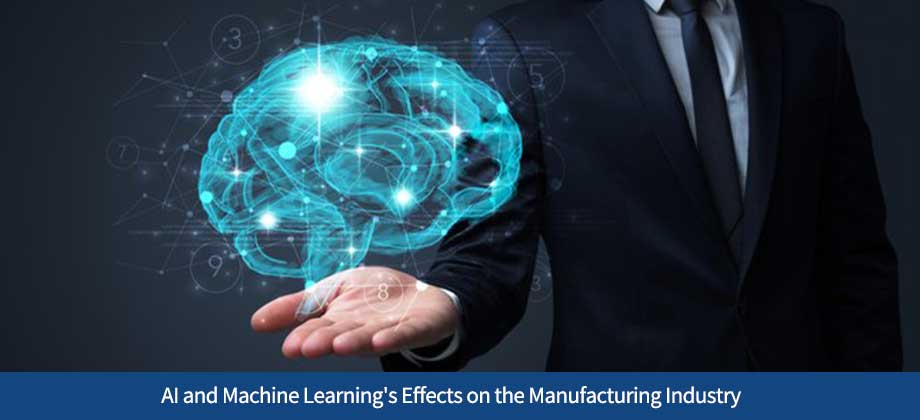AI and Machine Learning’s Effects on the Manufacturing Industry

Artificial Intelligence (AI) and machine learning have become buzzwords across many industries, revolutionizing the way tasks are processed and executed. The manufacturing industry is no exception, and it has been identified as one of the key areas where AI can produce significant improvements in innovation and efficiency. This article aims to delve deeper into how AI and machine learning are transforming the manufacturing industry, and analyzing the key benefits that are emerging.
Improved Efficiency
One of the primary advantages of incorporating AI and machine learning into the manufacturing industry is that it can significantly enhance efficiency. Machine learning algorithms can help reduce defects and optimize output from the very first stages of production. By analyzing patterns in data, machine learning algorithms can predict outcomes and provide insights into which manufacturing techniques will be most effective. This can help to streamline manufacturing processes while reducing overall costs.
Quality Control
Quality control is essential in the manufacturing industry, and AI has the potential to revolutionize this aspect of production. By using AI-enabled sensors to detect deficiencies and defects in the early stages, manufacturers can spot issues early before they become more severe or lead to product recalls. This can also help to save on the costs associated with quality control and minimize the chances of production downtime.
Predictive Maintenance
Machine learning algorithms can enable predictive maintenance to be carried out in the manufacturing industry. Predictive maintenance allows manufacturers to identify areas that may pose a risk to production before incidents occur. The utilization of cogent data from sensors and machine performance enables companies to predict when maintenance is due on a machine before failure, making their work efficient and cost-effective, thereby reducing downtime and unplanned service costs. Additionally, AI-operated robots can perform quality control checks efficiently, accurately, and quickly, reducing the possibility of human error, which substantially reduces waste. Enabling proactive maintenance measures can also eliminate the risk of unplanned downtime that can disrupt supply chains. As a result, machine learning algorithms are being extensively used to monitor equipment efficiency and identify future maintenance requirements.
Improved Safety
AI and machine learning can also help to improve safety in the manufacturing industry. With the use of machine learning algorithms, it is possible to identify potential safety hazards quickly. This includes detecting potential issues with heavy machinery and equipment, recognizing unsafe behavior among workers, and detecting potential safety violations. AI is reducing accidents and fatalities by utilizing information from sensors, cameras, and wearable technologies to detect and report hazards in real-time. This reduces the frequency of safety breaches, reduces the costs associated with accidents, and improves compliance with safety regulations.
Supply Chain Management
Another way in which AI is transforming the manufacturing industry is by improving supply chain management. AI-powered supply chain management analyzes data from various sources, such as sales, weather, and transportation, to create a more accurate demand forecast. The use of AI in materials planning and sourcing stimulates productivity and reduces inventory costs by optimizing the use of materials. With predictive analysis, manufacturers can anticipate demand trends, facilitate traceability, and improve the management of delivery schedules.
New Innovation
AI and machine learning are supporting the development of new products and improvements to existing products. AI systems can assess huge amounts of data and determine various patterns that can be analyzed to create major discoveries. The integration of machine learning and AI has enabled the testing and modeling of designs, making it faster, more accurate, and efficient, thereby reducing the product development cycle and cost for prototypes.
Better Resource Allocation
Resource allocation is another key area of focus for the manufacturing industry, and AI can help to optimize its utilization. Machine learning can analyze production data and help identify the areas of production that require additional resources. By identifying these areas, manufacturers can optimize their resource allocation and minimize waste, resulting in cost savings and more efficient production cycles.
In conclusion, the integration of AI and machine learning in manufacturing offers significant benefits to the industry. While every aspect of manufacturing can benefit from AI, it is vital to note that throwing AI into a factory probably won’t yield the expected results. Manufacturers must tailor AI to suit their production needs, with a clear understanding of the desired outcome. With the right implementation and the creation of a comprehensive AI strategy, the numerous benefits of AI can be realized across all areas of the manufacturing industry.
Your privacy is important to us. ARF Financial will never sell or rent your information to any third party. Click here for more information about our privacy policy.

